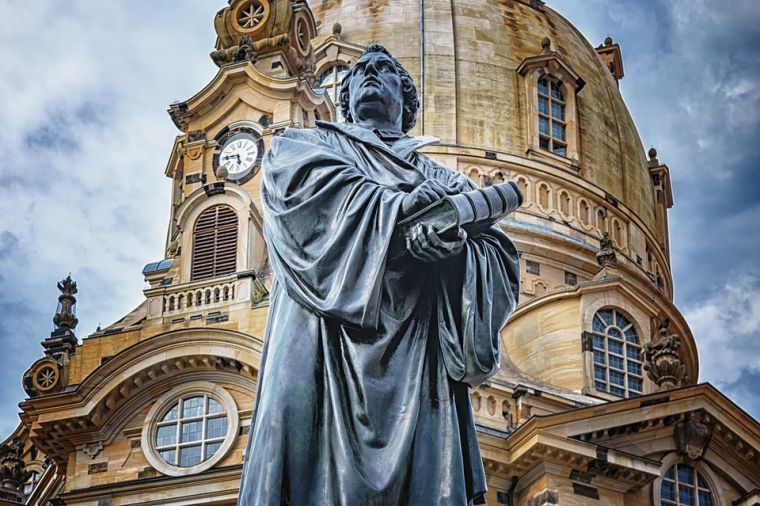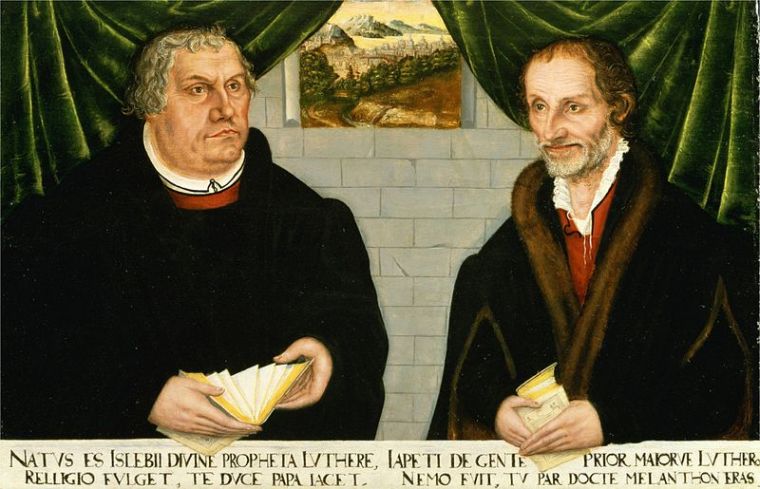How Martin Luther transformed the Church – and the world

This year marks the 500th anniversary of Martin Luther supposedly pinning his iconic '95 theses' to a local church door, thereby beginning what would be known as the Protestant Reformation.
Many may have heard of Luther, but would struggle to say much about his legacy. Others may be sure they know the man, but they may have got him wrong. Enter journalist Peter Stanford, who in his new book Martin Luther: Catholic Dissident (Hodder & Stoughton, £20), provides a new, popular biography of the man who stood up to an empire and transformed the Church. Stanford paints a vivid and dynamic portrayal of the friar and reluctant revolutionary Martin Luther, exploring his legacy not just for the Church, but for wider modern society.
He spoke with Christian Today about the book, and the compelling enigma of Martin Luther.
Many moderns today wouldn't consider Luther an interesting figure to study. Stanford says: 'People say to me, "Oh, he did amazing work with the Civil Rights Movement didn't he?"' confusing the 16th century friar with another religious icon – Martin Luther King Jr.
In 'an incredibly sceptical scientific age', Church disputes that took place 500 years ago are unlikely to thrill, Stanford says. For many Luther is 'dour, dusty, two-dimensional – belongs in the history books'. But he's far more radical, and relevant to the present – than people realise.
The age of the individual
Firstly, Luther, through the Reformation, 'broke the stranglehold of Catholicism over late medieval Europe. If that hadn't happened, Europe would be a very different place,' says Stanford.
Secondly, and crucially, Luther brought the Bible to the people. He wasn't the first to try this, but he was the first to do it successfully, 'and live to tell the tale'. Luther first translated the New Testament into German, and later the whole of Scripture, with an emphasis on using 'street language' that the masses might understand.
'He wanted to give people the word of God, he wanted to free people from this idea that the experts told you what to think. "Experts" as Michael Gove might put it. He wanted people to read scripture for themselves,' Stanford says.
'He was moving the Church away from a collective top-down organisation to the basis of individualism.'
Luther's ideas about 'justification by faith alone' would transform modern ideas about the self.

'His most basic idea was that when you died...at that moment God would judge you not on the good works you've done not on whether you'd followed what the pope told you to do, but on your faith, and your faith as informed by the Bible.
'You literally stood naked before God holding the Bible, is what he believed. In doing that, it was empowering...it was ideas about conscience, making your own mind up, even democracy.' Stanford notes that for a secular thinker like AC Grayling, 'the Enlightenment – for him the greatest moment ever – actually comes from Luther, Luther is the beginning of that.
'We live in a world where the bedrocks of western democracy are all around individual liberty, conscience...Luther would be slightly horrified by these things. But this is part of his legacy.'
Luther for the people
Following Luther's lead, Stanford has attempted to write his biography in a tone and form that the average layperson could understand. It is said that more books have been written about Luther than about Jesus – but often from the pens of insiders, Stanford says – Lutherans and academics. He wants to open Luther up with a familiar, 'flesh and blood' portrayal, capturing the drama of his life.
'There is a great sense of adventure, the extraordinary period in his life, from 1517 to 1521, when this obscure friar from an incredibly obscure university...in the backwoods of Germany, took on the papacy, the whole Catholic church.'
Luther risked his life in defiance of Church authority. At the Diet of Worms, insubordinate Luther was taken to task by the powers that be: 'They're challenging him and say "Unless you back down we're going to kill you." He says: "Here I stand, I can do no other." Would I be brave enough to do that?'
Stanford describes what followed Luther's stand – the inspiration given to the masses, the information soon widespread through the printing press, and Luther's own popularity, as a 'social media experience'.
He emphasises Luther as a 'Catholic dissident', an insider who wanted to reform the Church from within, not start a new one. What would he make of the Catholic Church today?
'I think he'd love it. I think he'd want to be a member of it.'
Another of Luther's iconic ideas was that of the 'priesthood of all baptised believers', an egalitarian doctrine that was later formalised in the Second Vatican Council of the Catholic Church. Luther got what he wished for.
'There is Luther saying, "We're all equal, all our experiences are absolutely as valid as each other's."'
Stanford, a Catholic himself, muses: 'Frankly if the Catholic Church took account of what individual believers...believed and thought, and the way that they interpreted their faith, over issues like divorce and remarriage, over gay marriage...we'd live in a better Church.'

A mixed legacy
What then is the legacy of the Protestant Reformation? Stanford is clear that the bloodshed that followed it, in Europe's infamous 'Wars of Religion', is 'absolutely to be lamented'. He notes however that those wars were also about a range of social, political, economic issues, and not simply religious affiliation.
Positively Stanford says, Luther challenged an 'appalling, hopelessly corrupt' papacy, and the 'ushering in of the age of the individual' is to be celebrated. Then again, there are 'drawbacks' to it: what he calls the 'shattering' of the Church into the thousands of denominations it numbers today. 'Each of us is a one-man church' he says.
For better or for worse, the Reformation also challenged religious certainty: 'What you see after Luther is that if you tell people they can read Scripture and make of it what they want then they will all disagree.'
Luther is also known negatively for anti-Semitic comments made later in his life, used by the Nazis in support of their crusade against the Jewish race. Is Luther responsible for modern antisemitism?
'No, absolutely not. He was antisemitic, I'm really not apologising for that,' Stanford says. He notes though that Luther, earlier in life, wrote things 'very progressive for his time'. Luther promoted 'the idea that people should marry Jews, should marry Muslims, he was more enlightened there'.
Luther probably never met a Jew, Stanford says, and the issue probably became quite abstract for him, fuelled by a sense that 'everything he did was guided by God'. Nonetheless, he was a product of his time: 'His attitudes to Jews were absolutely standard, are we going to damn every single person that lived in the 16th century?
'Christianity I'm afraid created modern antisemitism and we should all take the blame, there's a collective guilt, let's not try and pass this off on one man.'
Stanford writes in his book that 'those who discount Luther's 'religious' legacy because they have no time for God or gods, are only free to do so because of Luther's achievements.' Luther invited people to take the Scriptures and read them for themselves, but as Stanford says, 'one of the things you might make of them is that they're a pile of twaddle and you have no interest in them at all'.
Stanford applauds Luther's outstanding courage and – though many miss it – charisma. He calls the humble friar 'a man for his own age, but also for every age since'.
Stanford concludes: 'He was a bit antisemitic, he was always whinging about constipation, he felt the devil was everywhere, he could be pretty hard-line, unpleasant and angry.'
Nonetheless, he says: 'Just think what this man achieved from nowhere...he can't possibly have been dull.'
Martin Luther: Catholic Dissident (Hodder & Stoughton, £20) is out today, and can be purchased here.
You can follow @JosephHartropp on Twitter.











